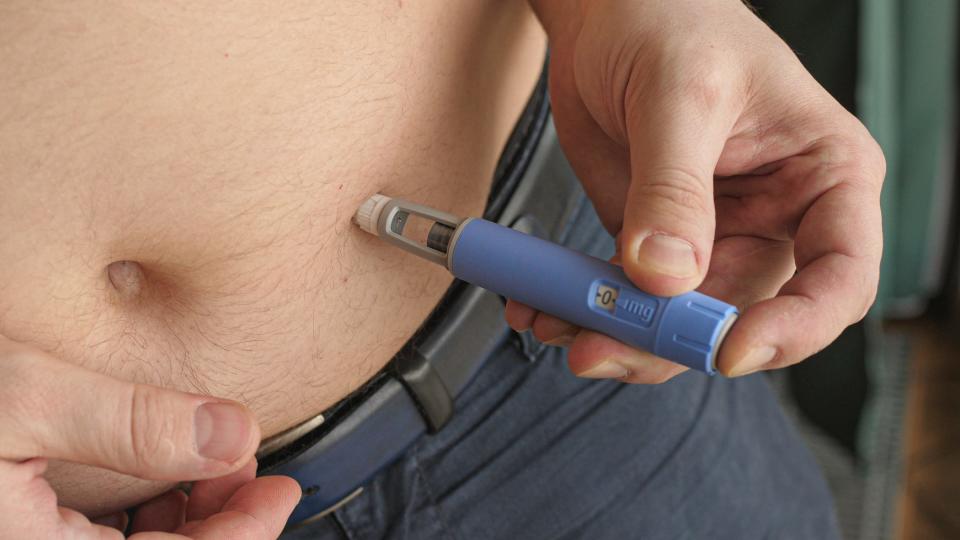I'm a doctor who lost 25 pounds on Ozempic. Here's why I still take a small 'maintenance dose' to keep the weight off.

New semaglutide drugs Ozempic and Wegovy help people lose weight by mimicking key hunger hormones.
But when people stop taking the drugs, they often regain much of what they lost.
A doctor taking the drug is trying a "maintenance dose" approach, hoping to avoid the issue.
This is an as-told-to essay based on a conversation with a 41-year-old doctor working in the Midwest. Insider verified his identity, medical license, and weight loss. It has been edited for length and clarity.
One of the biggest criticisms I've heard of Ozempic and Wegovy — the popular diabetes and weight loss medications that have become so popular on TikTok and in Hollywood — is about what happens after you're done taking them.
People who've gone on these new medications, generically called semaglutide, do tend to lose a considerable amount of weight. But, many have found out the hard way that when they stop taking the drug, their appetite comes roaring back.
I'm conducting a self-experiment to try and fix this problem.
I'm a doctor who has been on semaglutide for about a year now. I've lost about 25 pounds so far, and I'm fairly happy with my progress. I'm not necessarily looking to lose a bunch more weight, but I'm also not going off the medication anytime soon, because I don't want to "rebound." For myself, I've decided I'm going to spend at least six months to a year tapering myself off.
It's just a theory for now, but I think people's bodies might need some time to adjust to their new size and metabolism on these kinds of treatments. Perhaps tapering off the medication slowly could help.

Tapering works for antidepressants and steroids, why not Ozempic?
Doctors do this kind of thing all the time with other medications. It's common to prescribe antidepressants to treat acute mental health issues, for example. But evidence-based recommendations then suggest a very slow, deliberate weaning period for discontinuing those medications, as patients' symptoms improve. That's because quitting SSRIs cold turkey can lead to serious withdrawal issues including panic attacks and suicidal thoughts.
The same is true for some steroids, like prednisone. Patients with inflammatory conditions may go on steroids during a flare up, and then need time to taper off later on or risk withdrawal symptoms like fatigue, body aches and nausea. Like semaglutide, prednisone mimics a hormone that people produce naturally, so it makes some intuitive sense that a body would need some time to adjust to doing everything on its own again.
Ozempic is a newer drug, so there aren't really any well established best practices for how to come off of it yet. While the medication doesn't necessarily come with any dangerous withdrawal symptoms if patients suddenly stop taking it, that doesn't mean tapering is a bad idea.
For now, I'm on what I call a "maintenance dose"
Semaglutide works by mimicking GLP-1, a hormone that regulates how your liver metabolizes food. It slows down digestion, and sends satiety signals to your brain, telling you to feel fuller with less sustenance.
In one large-scale trial, patients regained more than 60% of the weight they lost on semaglutide after a year off the drug. But those patients had switched immediately from receiving 2.4 milligrams of the drug every week to 0 milligrams.
When I started taking semaglutide, I ramped my dosage up slowly, as is recommended. At first, I took 0.25 milligrams a week. I worked up to 0.5mg, and the weight loss continued. But doubling that dose to 1mg made me feel exhausted, and my weight loss progress seemed to be stalling out.
I switched to another similar drug for a while, called Mounjaro, and while it did help me to lose an extra 10 pounds, the higher my dosage went, the worse I felt. I wasn't taking in enough calories to function well. I decided to take a break from weight loss injections for a few weeks and like clockwork, my old appetite returned. I gained a few pounds back, but I also felt revitalized and well.
For the past few months, I've returned to a smaller 0.5 milligram dose of semaglutide. I consider this my "maintenance" phase. There is one even smaller 0.25 injection dosage I could drop down to at some point, if I want.
I hope giving my body time to adjust will prevent weight-regain
I plan to stay on this smaller dose for at least the next six months to allow my body to get used to its new normal before possibly stopping semaglutide completely. While I could maybe stand to shed 10 or 20 more pounds, I'm also happy with the progress I've made so far.
There isn't really any protocol suggesting that what I'm doing is going to work, but I'm not the only doctor trying this strategy out.
Dr. Alexandra Sowa, an obesity medicine specialist in New York, recently told the Wall Street Journal that both tapering and adding on other weight-management medications (like Qsymia) can help patients avoid the rapid rebound issues with GLP-1s.
It would be great if there were large-scale trials to test this idea out more legitimately. But until then, I'm willing to take things slow, and keep my weight steady. To date, I've lost more than 40% of the dangerous visceral fat around my belly — which can put people at risk for all kinds of health issues as we age, like heart disease and cancer.
So if it turns out my experiment works, and I can get my body used to its new weight, new waistline, and new metabolism by slowing drawing down my semaglutide dose, it'll be worth the extra time I'm spending tapering now.
Read the original article on Insider

 Yahoo Autos
Yahoo Autos